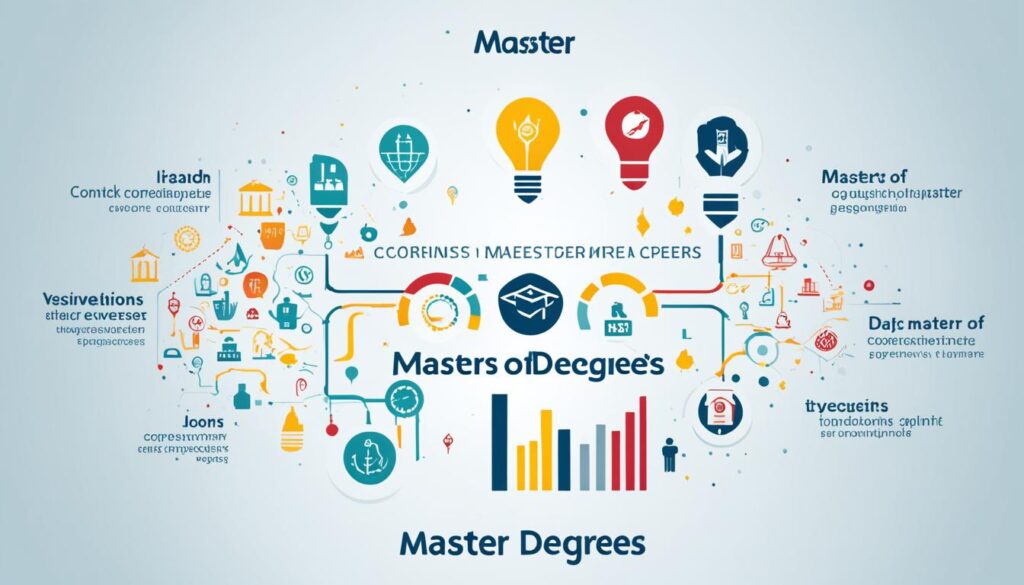Have you ever wondered how a master’s degree can dramatically reshape your career trajectory in today’s competitive job market? The master’s degree programs at The Continents States University offer a comprehensive curriculum designed for advanced education and professional advancement. With a variety of specialisations, you’re invited to explore how these programmes can enhance your skills and refine your expertise, ultimately leading to greater opportunities for success.
Key Takeaways
- Master’s degree programmes provide significant opportunities for professional advancement.
- Graduates often experience enhanced earning potential.
- The Continents States University offers a diverse range of master’s programmes.
- Choosing the right master’s degree depends on your career goals and personal interests.
- Flexible study options, including online learning, are available to accommodate different lifestyles.
Introduction to Master’s Degree Programs
Master’s degree programs serve as an essential avenue for individuals eager to advance their education through specialised knowledge and skills. The introduction to master’s degrees aims to provide a deeper understanding of subjects beyond the undergraduate level. These programmes focus on advanced studies, preparing you for leadership roles and further academic pursuits within your chosen field.
At The Continents States University, a diverse range of master’s degree programmes is available to help you align with your career aspirations. Whether you seek to enhance your expertise in specific domains or shift your professional trajectory entirely, these offerings cater to your educational needs in the context of higher education. Such academic preparation can lay the groundwork for success in a competitive market, allowing you to stand out among peers.
In this era of rapid change, pursuing a master’s degree can be a pivotal step towards achieving your professional ambitions. The structured environment of these programmes not only provides valuable knowledge but also opportunities for networking and collaboration with fellow students and industry professionals, further enriching your learning experience1.
Benefits of Pursuing a Master’s Degree
Obtaining a master’s degree offers numerous advantages for individuals seeking to elevate their professional journey. One of the most prominent benefits of master’s degrees lies in the enhanced career opportunities available to graduates. With this advanced qualification, you can access higher-level positions that may not be attainable with only an undergraduate degree.
Enhanced Career Opportunities
Graduates from master’s programs often enjoy a competitive edge in the job market, which can result in significant career advancement. For instance, employers typically seek candidates who possess advanced skills and specialised knowledge, factors that are often nurtured through master’s degree programmes. The steady increase in enrollment at institutions like Dakota State University, which has grown from 867 students in 1985 to 3,509 in 2023, reflects a recognition of this value2.
Higher Earning Potential
In addition to career opportunities, pursuing a master’s degree can substantially enhance your earning potential. Data suggests that individuals with advanced qualifications often experience higher salaries compared to their peers with undergraduate degrees. Notably, 99.7% of grads from Dakota State University in 2022 either secured employment or continued on to further their education2. This trend corroborates the long-term financial benefits associated with obtaining a master’s degree, making it a worthwhile investment in your future.
Types of Master’s Degree Programs Offered
At The Continents States University, you can explore a diverse array of types of master’s degrees designed to fit your career aspirations and academic interests. Each programme offers unique opportunities, whether you seek to advance in business, education, health sciences, or the creative fields of arts and humanities.
Master’s in Business Administration (MBA)
An MBA programme prepares you for leadership roles within various sectors. This degree focuses on essential business principles such as management, finance, and marketing, providing a robust foundation for aspiring business leaders.
Master’s in Education
Pursuing a Master’s in Education equips you with the skills necessary to enhance your teaching effectiveness and expand your career options. This degree is tailored for individuals looking to deepen their expertise in education degrees while contributing positively to student learning environments.
Master’s in Health Sciences
The Master’s in Health Sciences provides comprehensive knowledge about healthcare systems, policies, and practices. This programme is ideal for those who wish to make an impact in the growing field of health sciences, addressing emerging challenges in public health and healthcare management.
Master’s in Arts and Humanities
If you possess a passion for creativity and critical thinking, a Master’s in Arts and Humanities allows you to delve into diverse cultural studies, literature, and philosophy. This degree fosters analytical skills and encourages a deeper understanding of the human experience.

Choosing the Right Master’s Degree Program for You
Choosing master’s programs that align with your career goals and personal interests begins with self-reflection. Understanding your aspirations and capabilities can substantially impact your educational journey. This process involves evaluating what you hope to achieve in your future career and identifying how your interests and skills can help you reach those ambitions. The Continents States University offers comprehensive support to assist you in making well-informed decisions about your academic options.
Assessing Your Career Goals
When assessing your career goals, consider the industries you wish to enter and the positions you aspire to hold. Aligning your master’s degree with industry requirements can enhance employability. It is crucial to research potential career paths and the qualifications that are in demand, ensuring that the program you choose will equip you with the relevant knowledge and skills. For example, many graduates from Dakota State University have successfully transitioned into technology sectors, contributing significantly to the field. Over the past decade, DSU has garnered over $140 million in donations, supporting the growth and development of their programs, which may align with your aspirations2.
Evaluating Your Interests and Skills
Evaluating your personal interests is equally important when choosing master’s programs. Reflect on subjects that excite you and skills that you excel in, as this will guide you towards a programme that will engage and motivate you. For instance, if you are passionate about sports management, consider programmes that offer a blend of management theory with practical applications. The recent achievements of graduates at various institutions, such as the celebration of 24 students who completed an MBA or Master of International Sport Management, highlight the diverse opportunities available3. Ultimately, selecting a master’s programme that resonates with your interests will not only make your studies more fulfilling but also drive your career forward.
Reflecting on both your career ambitions and personal interests shapes the path to a successful educational journey. Make use of available resources and support systems at your chosen institution to guide you in this pivotal decision-making process234.
Duration and Structure of Master’s Degree Programs
When considering a master’s degree, understanding the duration of master’s programs and their structure is crucial for making informed decisions about your education. The flexibility offered in these programs can significantly influence your experience, aligning academic pursuits with personal and professional commitments.
Full-Time vs Part-Time Study
Master’s degree programs typically offer two main study formats: full-time and part-time study. Full-time study usually spans one to two years, allowing you to immerse yourself in the educational experience. Conversely, part-time study extends the duration of master’s programs, accommodating those who may be working or attending to other commitments.
- Full-time study enables quicker completion of the program, often with a more intensive coursework schedule.
- Part-time study permits greater flexibility, as you can adjust your course load per semester depending on your availability.
Online Learning Options
Online learning is increasingly favoured, providing an alternative for students who may face geographical barriers or are juggling professional responsibilities. This mode of education allows you to engage with course materials at your convenience, making it easier to balance your studies with other life demands. Many institutions offer robust online learning options, ensuring that you receive a quality education regardless of your location.
Admission Requirements for Master’s Degree Programs
Understanding the admission requirements is essential for aspiring students considering master’s programmes. You must be aware that educational qualifications play a critical role in the selection process. Typically, candidates are expected to hold a bachelor’s degree from a recognised institution. This foundational requirement ensures that you are academically prepared to tackle the rigours of advanced study.
Educational Background
Your educational background is a primary factor influencing your application to a master’s programme. Admissions committees look for candidates with strong academic records and relevant degrees that align with the desired field of study. In many cases, specific prerequisite courses may be required to demonstrate your preparedness for the chosen programme. You should carefully review these prerequisites before applying to ensure you meet the educational qualifications necessary for admission.
Standardised Test Scores
Standardised test scores may be a significant component of the admission requirements for master’s programmes. Tests such as the GRE or GMAT are often used to assess your academic readiness and potential success in graduate-level coursework. These scores, combined with your academic background, create a comprehensive view of your qualifications. Prepare adequately for these tests, as they can be influential in the admissions process, helping to highlight your aptitudes and commitment to pursuing advanced education.

Exploring Our Master’s Degree Programs Curriculum
The master’s programs curriculum at The Continents States University is meticulously designed to equip you with the essential skills and knowledge to excel in your chosen field. The programme structure features a combination of core courses and elective options, allowing you to tailor your educational experience according to your interests and career aspirations. In addition to traditional classroom learning, the curriculum emphasises hands-on learning experiences, which enhance your practical skills.
The course offerings encompass various subjects that reflect current trends and developments within each discipline, ensuring that your education is relevant and up-to-date. Opportunities for research are integrated into the programme, enabling you to engage in projects that contribute to your field while developing critical thinking and analytical skills.
This comprehensive approach not only prepares you for the challenges of your profession but also cultivates a network of connections among peers and faculty. The collaborative environment enhances learning and professional growth, ensuring you are well-prepared to navigate the workforce successfully.
Enrolling in a master’s program at The Continents States University means immersing yourself in a curriculum that fosters creativity, innovation, and lifelong learning—qualities that define successful professionals in today’s dynamic job market. Experience the difference that a thoughtfully constructed master’s programs curriculum can make in your academic and professional journey5.
What to Expect in a Master’s Degree Program
Enrolling in a master’s degree programme sets the stage for an academically rigorous experience. With elevated student expectations, you can expect a blended approach of theoretical knowledge and practical application.
Coursework and Assignments
Your master’s coursework will likely challenge your critical thinking and analytical skills. Intensive assignments foster a deeper understanding of your field, often leading to collaborative projects that simulate real-world scenarios. The structured approach requires adherence to deadlines and effective communication with peers, ensuring you develop vital professional skills alongside your academic learning.
Research Opportunities
Engaging in research in master’s programs is a key component that enriches your academic journey. You will have opportunities to contribute original research that can significantly impact your area of study. Faculty members usually encourage participation in ongoing projects and may guide you through the process of developing your own research proposals, fostering a supportive environment for academic growth.
Understanding these dynamics will prepare you for a fulfilling experience in your master’s programme, bridging the gap between theory and practical application367.
Networking and Professional Development Opportunities
During your master’s education, engaging in networking opportunities plays a critical role in both immediate and long-term professional development. Establishing connections with peers, faculty, and industry professionals not only enriches your learning experience but significantly contributes to your career growth.

The networking infrastructure at The Continents States University is robust, offering various platforms where you can connect with alumni and professionals across different fields. Alumni associations frequently host events, providing an excellent environment for you to forge valuable relationships that may aid you in job placements and internships. Such networking opportunities are crucial as they allow you to gain insights from those who have trodden the path before you.
Additionally, industry collaborations allow you to engage in real-world projects, enhancing your skills and expanding your professional network. Participating in workshops and seminars led by experienced professionals further equips you with knowledge and expertise relevant to your chosen field. These professional development opportunities can make a significant difference in how you navigate your career path post-graduation.
Ultimately, the blend of networking opportunities and professional development initiatives at The Continents States University not only fosters your employability but also propels your career growth through connectivity and skill enhancement8.
Financing Your Master’s Degree Program
Funding your master’s degree can often feel overwhelming, but several options are available to make the process manageable. Understanding scholarships, financial aid, and student loans plays a crucial role in your journey towards higher education.
Scholarships and Grants
Scholarships offer a fantastic opportunity to alleviate some of the financial burdens associated with master’s degree financing. Many institutions, including The Continents States University, provide a range of scholarships based on academic performance, financial need, or specific talents. Grants are another form of financial aid that does not require repayment, making them a desirable option. As you explore potential scholarships, consider the following benefits:
- Reduced overall tuition costs, allowing you to focus more on your studies.
- Recognition of your academic or extracurricular achievements, which can enhance your CV.
- Access to exclusive programs or mentorship opportunities tied to certain scholarships.
Student Loans and Financial Aid
For many students, loans become an essential part of financing their master’s education. Student loans allow you to cover tuition and living expenses, which can ease financial strain during your studies. Various loan options exist, including federal and private loans, each with different terms and interest rates. When seeking financial aid, be sure to:
- Evaluate your eligibility for federal financial aid, which often has lower interest rates.
- Research loan repayment options to find a plan that suits your financial situation.
- Apply for financial aid early, as many funds are awarded on a first-come, first-served basis.
Careful consideration of these financing methods can set you on a path to achieving your educational goals while managing costs effectively. Utilizing available resources and being proactive in your search for scholarships and financial aid can significantly impact your ability to succeed329.
Student Support Services at The Continents States University
The Continents States University provides a robust framework of student support services designed to assist you throughout your academic journey. These services play a crucial role in enhancing your educational experience and ensuring your well-being.
Academic Advising
The university’s academic advising services are dedicated to guiding you through the complexities of your degree programme. Advisors are available to help you select courses, understand degree requirements, and develop a plan that aligns with your future career aspirations. Regular consultations ensure that you remain on track and can address any academic concerns promptly.
Mental Health Resources
Your mental health is vital for academic success, and the university recognises this by offering extensive mental health resources. These services include counselling sessions, workshops on coping strategies, and stress management programs tailored to student needs. Taking advantage of these mental health resources can greatly enhance your academic experience and personal development.
The combination of academic advising and mental health resources forms the cornerstone of the university’s student support services, ensuring that you have the necessary tools to thrive, both academically and personally. Accessing these services is essential for navigating your educational path effectively and maintaining a healthy balance10.
Success Stories from Master’s Degree Graduates
Graduate success stories from The Continents States University illuminate the transformative power of pursuing a master’s degree. Alumni achievements demonstrate how advanced education can notably influence career paths and personal development. For instance, Dakota State University has attracted over $140 million in public and private donations over the past decade, reflecting a robust commitment to innovation and educational excellence2. The significant expansion of DSU’s campus, which includes a $40 million research and development facility, showcases the university’s dedication to providing top-notch resources for students2.
Consider the recent graduating cohort, where 24 students were celebrated for completing their MBA or Master of International Sport Management, indicative of the university’s efforts in nurturing skilled professionals within competitive fields3. The production of 44 degrees, including seven master’s degrees, further highlights DSU’s capacity to prepare students for various career corridors. Research from 2017 onwards, like the establishment of the Madison Cyber Labs and forthcoming quantum computer research, illustrates the commitment of the university to leading-edge programmes that effectively meet industry demands2.
Data shows that 99.7% of DSU graduates either secured jobs or continued their educational journeys, a testament to the enduring master’s degree impact on employment opportunities2. Alumni such as Dominik Pocrnja exemplify the program’s influence on career advancements, transitioning seamlessly from a bachelor’s degree to a graduate assistantship and eventually landing a significant role as Assistant Director of Athletics Communications3. These narratives not only reflect personal achievements but also signify the broader professional ecosystem shaped by The Continents States University’s master’s programmes.

The Future of Master’s Degree Programs
The landscape of master’s degrees is undergoing significant transformation, responding to the evolving programmes and educational trends worldwide. As industries become increasingly specialised, future of master’s degrees will likely place greater emphasis on tailored curricula that address specific professional needs. For example, the Oxford Pershing Square Graduate Scholarships offer comprehensive support for both MBA and Master’s degree programmes, highlighting the focus on developing global leaders who can tackle pressing challenges4.
With advances in technology reshaping education delivery, you may find innovative learning models incorporating hybrid classes and flexible schedules that cater to diverse student populations. The Continents States University is actively adapting its programmes in line with these educational trends, ensuring that students graduate with the skills and knowledge needed to thrive in their careers. This shift means that you can expect to engage with practical projects and real-world applications, making the learning experience more engaging and relevant than ever before.
As exemplified by recent graduates, such as those from the MBA and Master of International Sport Management programmes, diverse backgrounds are increasingly represented. Of the 28 graduates, 19 completed their bachelor’s degrees at Guilford College, showcasing how institutions are nurturing academic journeys across different fields3. As you consider your own path, embracing these evolving programmes may enhance your career opportunities and prepare you for success in a rapidly changing workforce.
Common Myths About Master’s Degree Programs
Many prospective students hold certain myths about master’s degrees that may deter them from pursuing further education. Understanding the truths behind these misconceptions can clarify the affordability and time commitment associated with master’s degree programmes. By debunking these myths, you can make informed decisions about your educational journey.
Cost and Affordability
A prevalent myth is that master’s degree programmes are prohibitively expensive. While costs can vary significantly depending on the institution and programme, there are many options for financial support. Scholarships, grants, and flexible payment plans can ease the burden of tuition, allowing you to pursue higher education without excessive strain on your finances. Understanding the true affordability of a master’s degree can help you recognise that financial constraints should not deter you from seeking advanced education.
Time Commitment
Another common misconception is that obtaining a master’s degree requires an overwhelming time commitment. In reality, many institutions offer part-time, online, and hybrid programmes that allow you to balance work and study. This flexibility means you can tailor your education to fit within your personal and professional life, dispelling the myth that a master’s programme will consume all your time. The reality is that you have options that accommodate various schedules, making advanced education more accessible than ever.
Conclusion
As you consider your path forward, the master’s degree programmes at The Continents States University stand as a beacon of opportunity. This advanced level of education not only enhances your career advancement possibilities but also equips you with valuable skills that are in demand across various sectors. The commitment to continuous learning demonstrated through pursuing a master’s degree can significantly influence your future professional landscape, making it a pivotal educational decision.
Reflecting on the insights shared throughout this article, it is clear that investing in a master’s degree is an endeavour that pays dividends. The diverse programme offerings ensure that you can find a course that aligns with your aspirations, while the flexible study options cater to your lifestyle needs. By leveraging the information provided, you can make an informed choice that aligns with your long-term career objectives.
As you embark on this educational journey, keep the essential components in mind – from admission requirements to potential financial support options. The road ahead is filled with possibilities, and taking the first step towards enrolment in a master’s degree programme could be the key to unlocking your full potential in the workforce111213.
Source Links
- Life-Changing Careers at Mayo Clinic – https://jobs.mayoclinic.org/job/rochester/it-business-relationship-director-department-of-surgery/33647/68280125728
- How a small SD college became a national cyber powerhouse – https://www.keloland.com/news/local-news/how-a-small-sd-college-became-a-national-cyber-powerhouse/
- Master’s Ceremony Salutes Newest MBA and MISM Graduates – https://www.guilford.edu/news/2024/08/masters-ceremony-salutes-newest-mba-and-mism-graduates
- Oxford Pershing Square Graduate Scholarships 2024-2025 in UK (Fully Funded) – Opportunities Pedia – https://opportunitiespedia.com/oxford-pershing-square-graduate-scholarships/
- New grant will support efforts to level the coding playing field – https://csumb.edu/news/news-listing/2024/q3/new-grant-will-support-efforts-to-level-the-coding-playing-field/
- Shannae Taylor: Peirce College Graduate’s Journey to Commencement – https://bucksco.today/2024/08/shannae-taylor-peirce-college/
- GATE Full Form: Graduate Aptitude Test in Engineering – https://www.imsindia.com/blog/gate/gate-full-form/
- Best Research Scholarships at Macquarie University Australia – https://academiamag.com/scholarships-at-macquarie-university-australia/
- NU graduate union sounding alarm on funding cuts for advanced student workers – Evanston RoundTable – https://evanstonroundtable.com/2024/08/03/nu-graduate-union-sounding-alarm-on-funding-cuts-for-advanced-student-workers/
- WHYY – https://whyy.org/
- Student Engagement Program Coordinator – Maryland – Montgomery County job with Montgomery College | 3195483 – https://careers.insidehighered.com/job/3195483/student-engagement-program-coordinator/
- Remote Adjunct – Online Health Sciences, Nutrition, and Fitness Course Developers – Maine, United States job with Husson University | 37693935 – https://jobs.chronicle.com/job/37693935/remote-adjunct-online-health-sciences-nutrition-and-fitness-course-developers/
- The Accident Rate in the Construction Sector: A Work Proposal for Its Reduction through the Standardization of Safe Work Processes – https://www.mdpi.com/2075-5309/14/8/2399


